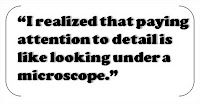As a young secretary in the late 90s, I was a new graduate from a technical school where I received a diploma in Secretarial Science. When I entered the workforce, I quickly found out that there were a few things that school didn't teach me: 1) how to use effective interpersonal skills, 2) how to deal with difficult people, and 3) paying attention to detail. My first week on the job, I discovered that paying attention to detail was going to make or break me in this line of work.
One day I was copying a fairly large document of about 60 pages and had to make 15 copies, double-sided, in color, and stapled. Simple, right? Not really. I heavily relied on the copy machine to do its job correctly.

After the first set of 5 completed copies, I was thumbing through one of the copies and noticed that a page was missing; 300 copies had already been completed! When I brought it to the attention of my supervisor, she asked me a simple, but odd question, "How do you make copies?" she emphasized the word, 'you.' I thought it was a trick question, so I replied, "I stand at the copier, load the document, input the specifics, and hit 'start.' My supervisor was not happy with that answer and I didn't know why at the time. I soon realized that she wasn't asking me about how the copies are made; she was asking me 'how do I make sure that the copies are being made.'
This is a question that we need to ask ourselves when we are working on projects, sending communication, completing daily tasks that seem mundane but can cost a hefty price if not observed. I realized that paying attention to detail is like looking under a microscope. Here are 3 ways to review the details in any given task:
- Don't rely on anything or anyone to get YOUR job done.Equipment malfunctions happen all the time, don't assume that the machine or people are working properly.
- Double Check the Process. Implement a check list or process for checking your work.The document was for a meeting of directors, can you imagine the fallout if it was discovered that a page was missing? I should have made one copy, and checked it to make sure it was what I needed, before 300 copies were made!
- Use a third eye.Come back to the task and review it after taking a break. This is a great technique to use when drafting an email or other correspondence. The third eye is a symbol of enlightenment, when you take a break and come back to resume the task, you are refreshed and enlightened to the fact that you may have left out some information or realize that revisions need to be made.

No comments:
Post a Comment